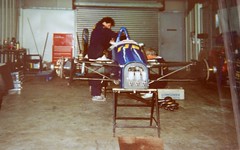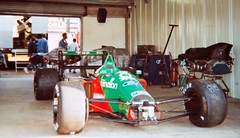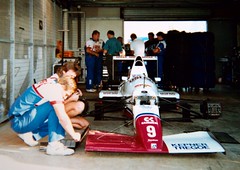Behind the Scenes
Last week I got an invite from Shell to get up close to the Ferrari team on the Saturday before the British Grand Prix. I couldn't take up their offer, unfortunately, owing to prior, more mundane commitments that weekend. Northampton is a long way from Edinburgh. A shame, because the opportunities for the ordinary race fan to get into the pitlane or paddock these days are very limited.

It wasn't always so. The other day, while clearing out, I stumbled upon some photos I had taken as a 10 year old kid, armed with my first camera, while wandering up and down the pitlane at the British Grands Prix of 1988 and 1989. Officially, the pits and paddock were off-limits to fans even then, with the Paddock Transfer and Pitlane Walkabout ticked having been phased out for no good reason that I can discern. In reality, though, it wasn't too difficult to get in and have a look at the cars up close and watch the preparations being made for Sunday's race. You just waited until the on-track action was over for the day on the Saturday evening and then wandered down the circuit to the pitlane. Nobody tried to stop you, no matter if you had no business being there.

Looking at those photos now, it's striking how much the sport had changed in the intervening couple of decades. There is far less by way of high-tech equipment in the garages, even those of the top teams like Mclaren and Ferrari. No need for banks of computers simply to fire the engine up, no arrays of TV monitors perched on the garage roof, and no bulky refuelling rigs requiring pit crews to be kitted out in expensive helmets and flame-proof overalls. Indeed, some of the smaller teams of the day, Osella and Rial, appear tnot to have crew members kitted out in 'team apparel' at alll. Their garages look like small, provincial car repair shops of the day, aside from the fact that the mechanics are working not on Ford Fiestas or Austin Metros, but on not-quite state of the art F1 cars. I've seen modern Formula Ford teams which appear more 'professionally' kitted out.

Then one Saturday evening, in April at Donington Park, we walked up the hill from the Craner Curves to the pitlane to find security guards at the entrance, demanding to see the passes we didn't have before they would give us access. Since then, I've never managed to get anywhere near the inside of the F1 paddock during race weekend. When I had a look at Spa last year, the security appeared on a par with what I'm used to dealing with at the entrance to Parliament, which at least has rather more reason to fear uninvited guests.

It's a shame, because I think one of the things that drew me towards the sport as a child were those evening walks up and down the paddock, seeing the mechanics burning the midnight oil, watching cars being dismantled and rebuilt, smelling the race fuel as engines were fired up from time to time. It gave the impression of a big, complex battle that was about so much more than running a car around for a couple of hours on a Sunday afternoon. And it gave a feeling of being up close to the action. When I was 7 years old, the Renault mechanics even invited me to come and sit in Derek Warwick's car while my father took photos - still the closest I've ever become to being an F1 driver!
As I write, I'm reading that the FOTA 'dissidents' have done a deal with the FIA and FOM and the breakaway series is no more. Quite what this deal involves remains unclear. One of the things which FOTA had been emphasising in their press releases on their renegade series was how much more 'fan friendly' they intended it to be - sensibly priced tickets, races at circuits that fans actually want to go to, rather than Grands Prix in countries with no interest in the sport, funded by authoritarian regimes in search of some good PR, that sort of thing. Whether this announcement means that there will be a US Grand Prix and no more wasting time on the Bahrain scalextric track, I rather doubt.
One thing that the sport's organisers could do to make the sport more fan friendly is to allow race-goers to get behind the scenes at races, to get into the paddock and the pitlane and see the work that goes into preparing a Formula 1 car up-close. I've heard it said that, these days, the sport is simply too big and it would be impractical to let the fans anywhere near the paddock. Certainly this is the line given by more than one team boss when pressed. With all due respect, I'm not convinced. The crowds at your average GP now are no larger than they were in the late 1980s - considerably smaller at some of the aforementioned races in countries where nobody's interested anyway. Teams are bigger now, but that means it would be all the easier for them to employ the minimal security needed to ensure that the more light-fingered spectators aren't tempted to try to run off with 'souvenirs'.
The other argument I've heard is that letting us mere race fans in would spoil the 'exclusive' atmosphere of the F1 paddock as a place where the movers and shakers mix - it's status as the sport's inner sanctum. Such an attitude highlights what is wrong with the grudging way in which the sport has treated race-going fans for too long.
Ultimately, the sport is reliant on the fact that people want to come see it, want to watch it on television, want to follow it. Without that, it wouldn't exist, at least not as anything more than a small private members club for the independently wealthy to play at being racing drivers. The corporate sponsors might pay the bills on a day-to-day basis, but those blue-chip companies are only there because the sport has a high media profile with millions of followers across the globe. Setting up the paddock club and barring access to all but wealthy corporate guests will only serve to drive those fans away over the long term. Treat the diehard fans with contempt and eventually they might stop coming through the gates altogether. And their kids probably won't bother watching the sport on TV. And then the paddock really will be an empty place.

It wasn't always so. The other day, while clearing out, I stumbled upon some photos I had taken as a 10 year old kid, armed with my first camera, while wandering up and down the pitlane at the British Grands Prix of 1988 and 1989. Officially, the pits and paddock were off-limits to fans even then, with the Paddock Transfer and Pitlane Walkabout ticked having been phased out for no good reason that I can discern. In reality, though, it wasn't too difficult to get in and have a look at the cars up close and watch the preparations being made for Sunday's race. You just waited until the on-track action was over for the day on the Saturday evening and then wandered down the circuit to the pitlane. Nobody tried to stop you, no matter if you had no business being there.

Looking at those photos now, it's striking how much the sport had changed in the intervening couple of decades. There is far less by way of high-tech equipment in the garages, even those of the top teams like Mclaren and Ferrari. No need for banks of computers simply to fire the engine up, no arrays of TV monitors perched on the garage roof, and no bulky refuelling rigs requiring pit crews to be kitted out in expensive helmets and flame-proof overalls. Indeed, some of the smaller teams of the day, Osella and Rial, appear tnot to have crew members kitted out in 'team apparel' at alll. Their garages look like small, provincial car repair shops of the day, aside from the fact that the mechanics are working not on Ford Fiestas or Austin Metros, but on not-quite state of the art F1 cars. I've seen modern Formula Ford teams which appear more 'professionally' kitted out.

Then one Saturday evening, in April at Donington Park, we walked up the hill from the Craner Curves to the pitlane to find security guards at the entrance, demanding to see the passes we didn't have before they would give us access. Since then, I've never managed to get anywhere near the inside of the F1 paddock during race weekend. When I had a look at Spa last year, the security appeared on a par with what I'm used to dealing with at the entrance to Parliament, which at least has rather more reason to fear uninvited guests.

It's a shame, because I think one of the things that drew me towards the sport as a child were those evening walks up and down the paddock, seeing the mechanics burning the midnight oil, watching cars being dismantled and rebuilt, smelling the race fuel as engines were fired up from time to time. It gave the impression of a big, complex battle that was about so much more than running a car around for a couple of hours on a Sunday afternoon. And it gave a feeling of being up close to the action. When I was 7 years old, the Renault mechanics even invited me to come and sit in Derek Warwick's car while my father took photos - still the closest I've ever become to being an F1 driver!
As I write, I'm reading that the FOTA 'dissidents' have done a deal with the FIA and FOM and the breakaway series is no more. Quite what this deal involves remains unclear. One of the things which FOTA had been emphasising in their press releases on their renegade series was how much more 'fan friendly' they intended it to be - sensibly priced tickets, races at circuits that fans actually want to go to, rather than Grands Prix in countries with no interest in the sport, funded by authoritarian regimes in search of some good PR, that sort of thing. Whether this announcement means that there will be a US Grand Prix and no more wasting time on the Bahrain scalextric track, I rather doubt.
One thing that the sport's organisers could do to make the sport more fan friendly is to allow race-goers to get behind the scenes at races, to get into the paddock and the pitlane and see the work that goes into preparing a Formula 1 car up-close. I've heard it said that, these days, the sport is simply too big and it would be impractical to let the fans anywhere near the paddock. Certainly this is the line given by more than one team boss when pressed. With all due respect, I'm not convinced. The crowds at your average GP now are no larger than they were in the late 1980s - considerably smaller at some of the aforementioned races in countries where nobody's interested anyway. Teams are bigger now, but that means it would be all the easier for them to employ the minimal security needed to ensure that the more light-fingered spectators aren't tempted to try to run off with 'souvenirs'.
The other argument I've heard is that letting us mere race fans in would spoil the 'exclusive' atmosphere of the F1 paddock as a place where the movers and shakers mix - it's status as the sport's inner sanctum. Such an attitude highlights what is wrong with the grudging way in which the sport has treated race-going fans for too long.
Ultimately, the sport is reliant on the fact that people want to come see it, want to watch it on television, want to follow it. Without that, it wouldn't exist, at least not as anything more than a small private members club for the independently wealthy to play at being racing drivers. The corporate sponsors might pay the bills on a day-to-day basis, but those blue-chip companies are only there because the sport has a high media profile with millions of followers across the globe. Setting up the paddock club and barring access to all but wealthy corporate guests will only serve to drive those fans away over the long term. Treat the diehard fans with contempt and eventually they might stop coming through the gates altogether. And their kids probably won't bother watching the sport on TV. And then the paddock really will be an empty place.
Labels: british grand prix, formula 1, grand prix, paddock transfers, photos, pitlane walkabouts

